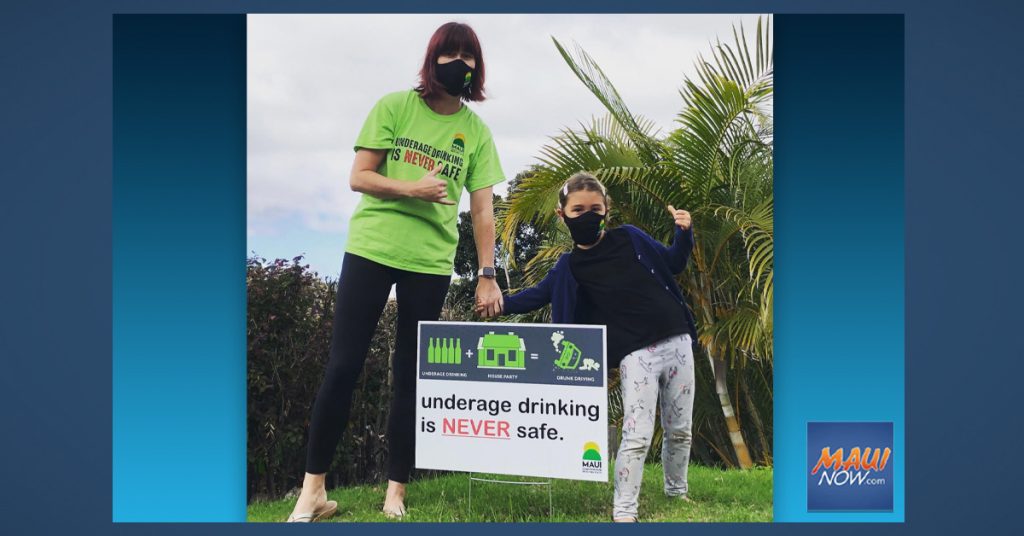Maui Ordinance to Prevent Underage Drinking Goes Into Effect Sept. 1
A new Social Host Liability Ordinance, which passed out of the county council in February, takes effect on Maui on Wednesday, Sept. 1, 2021.
The Hawaiʻi Public Health Institute’s Maui Coalition for Drug-Free Youth says the new law aims to tackle underage drinking at parties. The Social Host Liability Ordinance holds adults on the island of Maui accountable for illegal underage drinking on their property.

What is a social host ordinance?
Social host ordinances are local laws to prevent underage drinking and related consequences by holding the host of a gathering liable for illegal underage drinking occurring at their homes or on their property.
Similar to how a speeding ticket deters a driver from going dangerously fast, a social host ordinance deters people from allowing or ignoring underage drinking at house parties.
Under the Maui Social Host Liability Ordinance, if police are called to a gathering with underage drinking, the host can be fined $200 or more.
Why Pass a Social Host Ordinance in Maui?
“The Maui community wants to prioritize the safety and success of our youth, and underage drinking jeopardizes their futures,” said organizers with the Maui Coalition for Drug-Free Youth.
According to the organization: “Underage drinking parties are high-risk settings for binge drinking and associated alcohol problems, including impaired driving. Youth and young adults are often introduced to heavy drinking behaviors at these events by older adults.”
The Center for Disease Control’s 2019 Youth Risk Behavior Survey found that Maui County youth drink more alcohol and binge drink at higher rates compared to the statewide and national averages:
- 30% of Maui County high school students currently drink compared to 23% statewide
- 15% of Maui County high school students report binge drinking compared to 11% statewide
- 19% of Maui County middle school students had first drink before age 13
The same survey also found that during the past 30 days Maui County high school students reported:
- 17% rode with a driver who had been drinking alcohol
- 5% of drivers drove after drinking alcohol
Additional hyper-local data was collected by the Maui Coalition for Drug-Free Youth and community partners. In a 2019 survey of 449 Maui middle and high school students, youth reported that underage drinking occurred most often in private residences at parties or gatherings. Of those who attended the gatherings:
- 74% of youth reported binge drinking at house parties
Many of the youth surveyed have suffered, or know a peer who suffered, major consequences from underage drinking at house parties:
- 18% Sexual assault
- 22% Alcohol poisoning
- 29% Car crash/accident
- 33% Getting arrested
- 46% Fighting
Where do Maui youth get alcohol from?
According to the 2019 Youth Risk Behavior Survey:
- 38% usually obtained the alcohol they drank by someone giving it to them
Theft and retail sources were much less common:
- 13% usually took it from a store or family member
- 12% usually gave someone money to buy it for them
- 5% usually bought the alcohol they drank from stores, gas stations, restaurants and bars
What will the Maui Social Host Liability Ordinance do?
Maui Coalition for Drug-Free Youth says this ordinance makes it easier for police to deter underage drinking “by swiftly issuing fines when they are called to a gathering where underage drinking is happening.”
Unlike Hawaiʻi’s state Social Host Ordinance, which is criminal, the Maui Social Host Liability Ordinance is civil. “This makes it faster to enforce, without overburdening the court system or creating a criminal record for those who are cited. It complements the state ordinance, while better fitting the needs of the Maui community,” said leaders with the Maui Coalition for Drug-Free Youth.
“For Maui, this law will not only improve the public health and safety of the entire community but will especially improve the lives of our youth. Less underage drinking at house parties leads to fewer incidents of teen sexual assaults, fights, drunk driving, alcohol-related ER visits, and arrests. If enforced, it will save lives,” said organization leaders.
“Losing someone to an alcohol-related accident, or experiencing assault or abuse due to alcohol are traumatic experiences that stay with people for life. Fortunately, we can prevent more tragedies by stopping underage drinking,” according to organization leaders.







